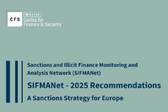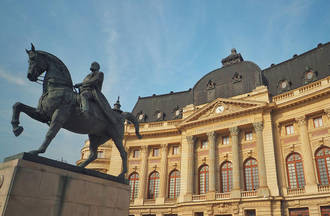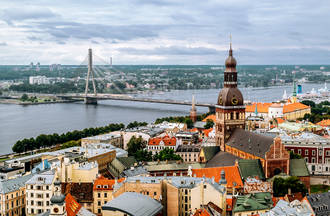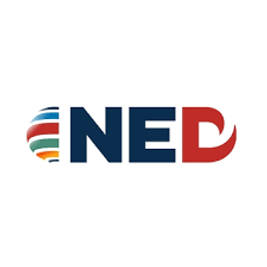Sanctions and Illicit Finance Monitoring and Analysis Network (SIFMANet)
SIFMANet brings together research institutions to raise awareness and inform policymaking against the illicit financial flows that continue to undermine our democracies.
SIFMANet is a collaborative network, led by the Centre for Finance and Security at RUSI. Its mission is simple but urgent: to strengthen Europe's ability to defend democracy against the growing national security threat of illicit finance, and to turn insight into real, practical policy solutions.
In the years since Russia’s invasion of Ukraine, the financial frontlines of global security have become impossible to ignore. Money is no longer just an economic tool; it’s a weapon that can undermine institutions, distort public life, and erode the very foundations of our democracies. Yet too often, illicit finance is still seen as a criminal or technical issue, not as the profound security challenge it truly is.
By bringing together civil society, academia, government, and the private sector, SIFMANet seeks to help think smarter and act faster, building a collective response that protects the integrity of our systems and the values we share.
Updated recommendations

SIFMANet offers its third set of sanctions recommendations, which will drive our work in 2025, shaped to reflect this changing background whilst ensuring that the international security role sanctions are intended to play for Europe is cemented and strengthened, whether against Russia or other threats.
Our team
Kinga Redlowska
Head of CFS Europe
Centre for Finance and Security
Tom Keatinge
Director, CFS
Centre for Finance and Security
Gonzalo Saiz Erausquin
Research Fellow
Centre for Finance and Security
Irina Mamulashvili
Russia Sanctions Implementation Project Officer
Centre for Finance and Security
Balázs Gyimesi
External Relations and Communications Manager, RUSI Europe
Communications and Marketing
Vlada Yaremenko
Communications Coordinator
Communications and Marketing
Dr Daryna Dvornichenko
Russia Sanctions Programme Manager, CFS
Centre for Finance and Security
Objectives
SIFMANet intends to address identified shortcomings and unanswered challenges that Europe and its partners face. It aims to:
- Act as a convener by creating a platform for sanctions professionals to exchange ideas on how to make sanctions more effective.
- Collect on-the-ground insights from members and share findings with partners in Brussels.
- Influence the debate about the future of sanction by engaging with media, testifying before parliaments, briefing stakeholders on developments and offering recommendations to policymakers.
- Highlight the importance of applying a national security lens to the threats posed by illicit finance to the EU and connected states and their democratic systems.
- Create a collaborative network of institutions to ensure sanctions and illicit finance remain central to the EU security and policy agenda.
Roundtables
Read the roundtable discussion summaries and watch some of the session recordings
Summits
Each year, the SIFMANet community convenes to discuss the latest developments in the sanctions world, address current challenges, and examine the most pressing aspects of sanctions implementation.
As the deployment of G7 sanctions is a highly dynamic process, we respond accordingly. Each year, our focus shifts to the areas where action is most needed, and impact can be greatest.
So far, we have organised:
- SIFMANet Summit in Brussels, March 2023
- SIFMANet Summit in Riga, March 2024
- SIFMANet Summit in Brussels, November 2024
Upcoming: SIFMANet Summit in Brussels, 4 December 2025
After each summit, we produce recommendations for policymakers for the year ahead and disseminate them within our network and beyond.
Recommendations

SIFMANet offers its third set of sanctions recommendations, which will drive our work in 2025, shaped to reflect this changing background whilst ensuring that the international security role sanctions are intended to play for Europe is cemented and strengthened, whether against Russia or other threats.
Translations
2024 SIFMANet Recommendations: Making Sanctions Work - Czech Translation
2024 SIFMANet Recommendations: Making Sanctions Work - Hungarian Translation
2024 SIFMANet Recommendations: Making Sanctions Work - Latvian Translation
2024 SIFMANet Recommendations: Making Sanctions Work - Lithuanian Translation
2024 SIFMANet Recommendations: Making Sanctions Work - Polish Translation
Translations
Recommendations for Effective Sanctions Against Russia - Czech Translation
Recommendations for Effective Sanctions Against Russia - French Translation
Recommendations for Effective Sanctions Against Russia - Lithuanian Translation
Recommendations for Effective Sanctions Against Russia - Polish Translation
Network members and sponsor
SIFMANet is a community of institutions, organisations, think tanks and experts from across Europe and beyond, working together to strengthen the effective implementation of sanctions and countering illicit finance that undermines democracy.
We bring our members together through monthly learning sessions, practical resources, and tailored guidance, helping them deepen their expertise and stay ahead of emerging challenges. As a collaborative platform, we connect sanctions experts from different countries, creating space for regular dialogue, knowledge-sharing, and joint problem-solving.
By fostering these connections, we ensure our members are well-equipped to engage audiences in their own countries and languages with clarity and confidence.
Project sponsor
National Endowment for Democracy (NED)
The National Endowment for Democracy (NED) is a private, non-profit foundation dedicated to the growth and strengthening of democratic institutions around the world. Each year, NED makes more than 2,000 grants to support the projects of non-governmental groups abroad who are working for democratic goals in more than 100 countries.
Find out more
Latest publications
View all publicationsLoading results...









































